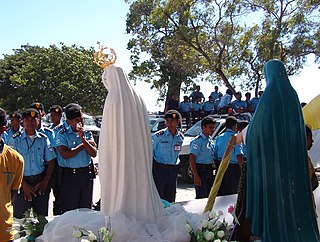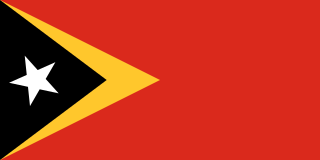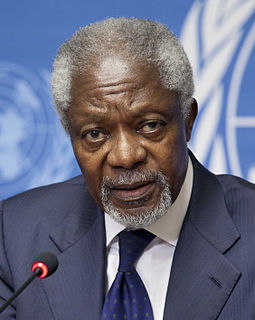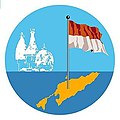
East Timor is a country in Southeast Asia, officially known as Democratic Republic of Timor-Leste. The country comprises the eastern half of the island of Timor and the nearby islands of Atauro and Jaco. The first inhabitants are thought to be descendant of Australoid and Melanesian peoples. The Portuguese began to trade with Timor by the early 16th century and colonised it throughout the mid-century. Skirmishing with the Dutch in the region eventually resulted in an 1859 treaty for which Portugal ceded the western half of the island. Imperial Japan occupied East Timor during World War II, but Portugal resumed colonial authority after the Japanese surrender.

Bacharuddin Jusuf Habibie is an Indonesian engineer who was President of Indonesia from 1998 to 1999. He succeeded Suharto, who resigned in 1998. His presidency is seen as a transition to the post-Suharto era. Upon becoming president, he liberalized Indonesia's press and political party laws, and held an early democratic election in 1999, which resulted in the end of his presidency. His presidency was the third, and the shortest, after independence.

The International Force East Timor (INTERFET) was a multinational non-United Nations peacemaking taskforce, organised and led by Australia in accordance with United Nations resolutions to address the humanitarian and security crisis that took place in East Timor from 1999–2000 until the arrival of UN peacekeepers. INTERFET was commanded by an Australian, Major General Peter Cosgrove.

Falintil originally began as the military wing of the political party FRETILIN of East Timor. It was established on 20 August 1975 in response to FRETILIN’s political conflict with the Timorese Democratic Union (UDT).

The Indonesian invasion of East Timor, known in Indonesia as Operation Lotus, began on 7 December 1975 when the Indonesian military invaded East Timor under the pretext of anti-colonialism. The overthrowing of a popular and briefly Fretilin-led government later sparked a violent quarter-century occupation in which between approximately 100,000–180,000 soldiers and civilians are estimated to have been killed or starved to death. The Commission for Reception, Truth and Reconciliation in East Timor documented a minimum estimate of 102,000 conflict-related deaths in East Timor throughout the entire period 1974 to 1999, including 18,600 violent killings and 84,200 deaths from disease and starvation; Indonesian forces and their auxiliaries combined were held responsible for 70% of the killings.

The United Nations Integrated Mission in East Timor (UNMIT) was established on 25 August 2006 by UN Security Council Resolution 1704. Its objectives are "to support the Government in consolidating stability, enhancing a culture of democratic governance, and facilitating political dialogue among Timorese stakeholders, in their efforts to bring about a process of national reconciliation and to foster social cohesion". In its most recent resolution on UNMIT, the Council extended its mandate until 26 February 2012. UNMIT and ISF troops left the country at the end of 2012.

The Indonesian occupation of East Timor began in December 1975 and lasted until October 1999. After centuries of Portuguese colonial rule in East Timor, a 1974 coup in Portugal led to the decolonisation of its former colonies, creating instability in East Timor and leaving its future uncertain. After a small-scale civil war, the pro-independence Fretilin declared victory in the capital city of Dili and declared an independent East Timor on 28 November 1975.

The National Council of Maubere Resistance was an umbrella organisation of East Timorese individuals and organisations dedicated to resisting the Indonesian occupation of 1975–1999.

The 1999 East Timorese crisis began with attacks by anti-independence militants on civilians, and expanded to general violence throughout the country, centered in the capital Dili. The violence erupted after a majority of eligible East Timorese voters chose independence from Indonesia. Some 1,400 civilians are believed to have died. A UN-authorized force (INTERFET) consisting mainly of Australian Defence Force personnel was deployed to East Timor to establish and maintain peace.

East Timor and Indonesia share the island of Timor. Indonesia invaded the former Portuguese colony in 1975 and annexed East Timor in 1976, maintaining East Timor as its 27th province until a United Nations-sponsored referendum in 1999, in which the people of East Timor chose independence. Following a United Nations interim administration, East Timor gained independence in 2002. After 2002, their relations are good. Indonesia has an embassy in Dili. East Timor has an embassy in Jakarta and a consulate in Denpasar and Kupang.

United Nations Security Council resolution 1236, adopted unanimously on 7 May 1999, after recalling previous resolutions on East Timor including 384 (1975) and 389 (1976), the Council welcomed an agreement between Indonesia and Portugal on the future of East Timor and a proposed United Nations presence to assist with the East Timor Special Autonomy Referendum scheduled for August 1999.
United Nations Security Council resolution 1246, adopted unanimously on 11 June 1999, after recalling previous resolutions on East Timor, particularly Resolution 1236 (1999), the Council established the United Nations Mission in East Timor (UNAMET) to organise and conduct the East Timor Special Autonomy Referendum on the future status of East Timor, scheduled for August 1999.

United Nations Security Council resolution 1257, adopted unanimously on 3 August 1999, after recalling previous resolutions on East Timor, particularly Resolution 1246 (1999), the Council extended the mandate of the United Nations Mission in East Timor (UNAMET) until 30 September 1999.

United Nations Security Council resolution 1262, adopted unanimously on 27 August 1999, after recalling previous resolutions on East Timor, particularly resolutions 1246 (1999) and 1257 (1999), the Council extended the mandate of the United Nations Mission in East Timor (UNAMET) until 30 November 1999.
United Nations Security Council resolution 1264, adopted unanimously on 15 September 1999, after recalling previous resolutions on East Timor (Timor-Leste), the Council authorised the establishment of the multinational International Force for East Timor (INTERFET) to restore peace and security in the territory, facilitate humanitarian assistance and protect the United Nations Mission in East Timor (UNAMET).

United Nations Security Council resolution 1410, adopted unanimously on 17 May 2002, after recalling previous resolutions on East Timor (Timor-Leste), particularly resolutions 1272 (1999), 1338 (2001) and 1392 (2002), the Council established the United Nations Mission of Support to East Timor (UNMISET) to replace the United Nations Transitional Administration in East Timor (UNTAET).

The Indonesia–Timor Leste Commission on Truth and Friendship was a truth commission established jointly by the governments of Indonesia and East Timor in August 2005. The commission was officially created to investigate acts of violence that occurred around the independence referendum held in East Timor in 1999 and sought to find the "conclusive truth" behind the events. After holding private hearings and document reviews, the commission handed in the final report on July 15, 2008 to the presidents of both nations, and was fully endorsed by Indonesian President Susilo Bambang Yudhoyono, providing the first acknowledgement by the government of Indonesia of the human rights violations committed by state institutions in Timor. The commission is notable for being the first modern truth commission to be bilateral.
Australia, a close neighbour of both Indonesia and East Timor, was the only country to recognise Indonesia's annexation of East Timor. Some members of the Australian public supported self-determination for East Timor, and also actively supported the independence movement within Australia. The Australian Government saw the need for both stability and good relations with their neighbour, Indonesia. However, it was criticised in some quarters, including by Xanana Gusmão for putting those issues above human rights. In 1998, the Howard Government changed its stance and supported East Timor self-determination, prompting a referendum that saw East Timor gain its independence.

Mário Viegas Carrascalão was an East Timorese politician and diplomat. Carrascalão, a founder of the Timorese Democratic Union [UDT) in 1974 and the Social Democratic Party (SDP) in 2000, served as the Governor of East Timor from 1983 to 1992 during the Indonesian occupation of the country. However, he re-joined the East Timorese government following the 1999 independence referendum and the transition to independence. He later served as a Deputy Prime Minister within the IV Constitutional Government of then-Prime Minister Xanana Gusmão from 2009 to 2010.






















